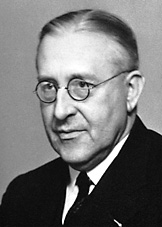- Victor Francis Hess
Infobox Scientist
name = Victor Francis Hess
image_width = 170px
caption = Victor Francis Hess
birth_date = birth date|1883|6|24
birth_place =Waldstein Castle , nearPeggau ,Austria
death_date = death date and age|1964|12|17|1883|6|24
death_place = Mount Vernon,New York ,USA
nationality =Austria ,United States
field =Physics
work_institutions =University of Graz Austrian Academy of Sciences University of Innsbruck Fordham University
alma_mater =University of Graz
known_for = discovery ofcosmic rays
prizes =Nobel Prize in Physics 1936Victor Francis Hess (
June 24 ,1883 –December 17 ,1964 ) was anAustria n-Americanphysicist , and Nobel laureate in physics, who withCarl David Anderson discoveredcosmic ray s.Early life
Hess was born to Vinzens Hess and Serafine Edle von Grossbauer-Waldstätt, in Waldstein Castle, near Peggau in Styria, Austria. His father was a royal forester in Prince Öttingen-Wallerstein's service. He attended secondary school at
Graz Gymnasium from 1893 to 1901.cite web|title=Victor Francis Hess Biography|url=http://nobelprize.org/nobel_prizes/physics/laureates/1936/hess-bio.html|date=1936|work=The Nobel Foundation|accessdate=2007-10-04] cite book|last=Angelo|first=Joseph A|title=Nuclear Technology|url=http://books.google.com/books?id=ITfaP-xY3LsC|date=2004|pages=121-124|publisher=Greenwood Press|isbn=1573563366]Academic life
From 1901 to 1905 Hess was an undergraduate student at the
University of Graz , and continued postgraduate studies in physics until he received his PhD there in 1910. He worked as Assistant under Stephan Meyer at the Institute of Radium Research, Viennese Academy of Sciences, from 1910 to 1920. Hess took at leave of absence in 1921 and travelled to the United States, working at the US Radium Corporation, inNew Jersey , and as Consulting Physicist for the US Bureau of Mines, inWashington DC . In 1923, he returned to the University of Graz, and was appointed the Ordinary Professor of Experimental Physics in 1925. TheUniversity of Innsbruck appointed him Professor, and Director Institute of Radiology, in 1931.Hess relocated to the United States with his
Jew ish wife in 1938, in order to escapeNazi persecution. The same yearFordham University appointed him Professor of Physics, and he later became a naturalized United States citizen in 1944. Retiring from Fordham in 1956, Hess died on17 December 1964 , in Mount Vernon, New York, United States. [cite web|title=Commonly Asked Questions About Victor Francis Hess |url=http://www.britannica.com/eb/question-264120/51/Victor-Francis-Hess-died|work=Encyclopædia Britannica |accessdate=2007-10-04]Pioneering discovery
Between 1911 and 1913, Hess undertook the work that won him the Nobel Prize in Physics in 1936. For many years, scientists had been puzzled by the levels of ionizing radiation measured in the atmosphere. The assumption at the time was that the radiation would decrease as the distance from the earth, the source of the radiation, increased. The electroscopes previously used gave an approximate measurement of the radiation, but indicated that higher in the atmosphere the level of radiation may actually be more than that on the ground. Hess approached this mystery first by greatly increasing the precision of the measuring equipment, and then by personally taking the equipment aloft in a balloon. He systematically measured the radiation at altitudes up to 5.3 km during 1911-12. The daring flights were made both at day and during the night, at significant risk to himself.
The result of Hess's meticulous work was published in the Proceedings of the Viennese Academy of Sciences, and showed the level of radiation decreased up to an altitude of about 1 km, but above that the level increased considerably, with the radiation detected at 5 km about twice that at sea level. His conclusion was that there was radiation penetrating the atmosphere from outer space, and his discovery was confirmed by Robert Andrews Millikan in 1925, who gave the radiation the name "
cosmic ray s". Hess's discovery opened the door to many new discoveries in nuclear physics.Publications
*cite book | last=Hess | first=Victor F. | title=The Electrical Conductivity of the Atmosphere and Its Causes | date=1928 | publisher=Constable & Company | oclc=1900377
Honours and awards
*Lieben Prize (1919)
*Abbe Memorial Prize
*Abbe Medal of the Carl Zeiss Institute in Jena (1932)
*Nobel Prize in Physics (1936)References
External links
* [http://nobelprize.org/physics/laureates/1936/hess-bio.html Biography and Nobel lecture (nobelprize.org)]
Wikimedia Foundation. 2010.
